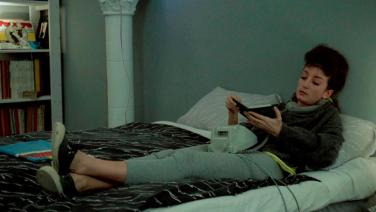
Les Nuits de la pleine lune (Éric Rohmer, France, 1984, 101')
OV FR, Sub EN-ES
Pascale's character is called Louise, a decorator who lives on the outskirts of Paris, east of the big city, in a newly built residential neighbourhood with modern apartments. The film belongs to the Comedies and Proverbs series by Rohmer and begins with the following quote:
The one who has two wives loses his soul.
The one who has two houses loses his mind.
It's winter. Louise divides her days between her work in the centre of Paris, commuter train travel, and her life on the outskirts in the company of her partner, Rémi. But Louise needs her own space. A room of her own. A life for her, beyond the one she shares with her partner. “I need to be alone from time to time. All alone”, she says. The film seems like it is going to pose a love triangle, but it is not that either, as Louise is looking for something else. For starters, the apartment she has for herself in Paris.
I have always had the feeling that this was the film in which Rohmer spoke for the first time about what really was happening to a certain Parisian youth. About their doubts, fears, wishes, and desires. About how they have fun. About how they don't have fun. About a certain uneasiness and a certain joy. And there, the presence of Pascale in the film's writing and ideation process is fundamental. In the credits, she appears as the main actress and as the art director (the art direction work and costumes are excellent). But it is obvious that there is much of the real Pascale in the story of that character in her youth.
For Rohmer, Pascale was an accomplice in the whole process. Some of the questions in the film may have more to do with the themes that Rohmer was touching upon and portraying in his comedies and proverbs: who to love, where to live, when to "grow up", whether to have children or not. But Pascale brings attitude, tone, style, emotion, and an unforgettable presence. Pascale is the movie. So much so that the Venice Film Festival awarded her performance with the Volpi Cup for Best Actress. And it was the president of the panel himself, Michelangelo Antonioni, who presented her with the award.
In this way, Pascale's upward trajectory was confirmed. Everything was possible from this film on.
The party and the first dance arrive at minute 23. A large house in Paris with a few elegantly dressed guests, but also with young people in street clothes, dressed informally. Pascale begins dancing with her friend and confidant Octave (Fabrice Luchini), who is more concerned with observing who is at the party than dancing. He seems absent. Pascale does not. Pascale is inside, inside the rhythm of the song that is playing: Les Tarots, by Elli et Jacno. At one point, Pascale makes eye contact with a young man who is also dancing: a tall, somewhat lanky guy who is wearing a strange mix of casual clothes and flesh-coloured mittens on his hands. They look at each other, smile, and start dancing together. Pascale's black dress has two zippers on its straps, like in eighties fashion from when zippers were a symbol of being rebellious -- something punk yet, at the same time, slight. Then the camera begins to descend towards Pascale's feet, little by little. And there lies the rhythm. Two black high heels, dancing. That gesture. I am left with that gesture, with that camera movement that goes from the happiness of Pascale's face dancing with a stranger she likes down to her feet, surrendered to the natural and wild rhythm of a free life.
Pascale dances.
Víctor Iriarte
Pascale Ogier on focus.
